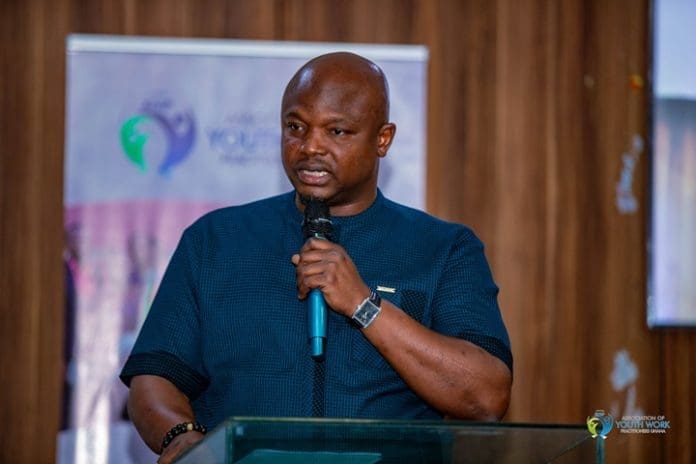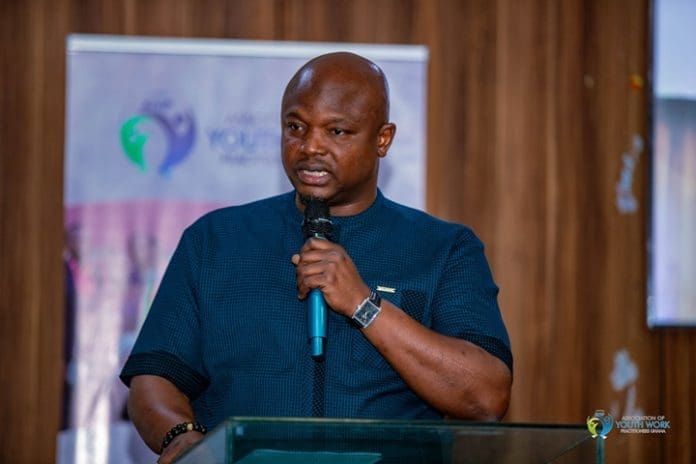
Youth Development and Empowerment Minister George Opare Addo has called for fundamental restructuring of how Ghana approaches youth work, declaring that the sector must transition from passion-driven initiatives to structured, policy-based frameworks that ensure sustainability and measurable impact.
Speaking through Alhaji Inusah Mahama, Deputy CEO of the National Youth Authority, at the official relaunch of the Association of Youth Work Practitioners on September 30, 2025, in Accra, Opare Addo emphasized that good intentions alone cannot deliver the transformative outcomes Ghana’s youth population requires.
“Youth work must be built on policy, not passion,” the minister stated emphatically. “We cannot continue to rely solely on good intentions in our work with young people. If our efforts are to be sustainable and impactful, youth development must be structured, professionalized, and policy-driven.”
The message signals a potentially significant shift in government thinking about youth development. Rather than celebrating volunteerism and enthusiasm as sufficient, the minister’s remarks suggest recognition that Ghana’s youth sector requires the same professional standards applied to healthcare, education, and other critical national services.
Alhaji Mahama expanded on these concerns, identifying fragmented approaches and absent standardized training as major obstacles preventing youth work from achieving its potential impact. Without clear policies and professional standards, he warned, youth work risks remaining “a fragmented passion project rather than a powerful tool for national development.”
His comments point to uncomfortable realities within Ghana’s youth development landscape. Numerous organizations and individuals work with young people, often duplicating efforts or operating without coordination. This fragmentation wastes resources and limits the sector’s collective effectiveness.
The timing of this policy push coincides with broader government initiatives targeting youth employment and empowerment. The Mahama administration has launched multiple programs including the National Apprenticeship Programme and Adwumawura initiative, both requiring structured implementation frameworks to succeed at scale.
Theodora Anti Williams, Co-Chair of the Association of Youth Work Practitioners, echoed the minister’s vision, calling for youth work to evolve from voluntary enthusiasm into structured professional service. She emphasized that young people deserve professional dedication supported by robust policies that protect their interests and unlock their potential.
Her appeal included specific calls for certification systems and formal training programs to empower and legitimize youth workers. Currently, Ghana lacks standardized qualifications or career pathways for youth work professionals, making it difficult to attract talented individuals or ensure consistent quality across interventions.
International perspectives reinforced the professionalization message. Layne Robinson, Head of Social Policy Development at the Commonwealth Secretariat, highlighted the global imperative for professionalizing youth work, drawing parallels to expectations for doctors and teachers.
“We want the very best for our young people,” Robinson stated. “Just as we expect doctors and teachers to be trained professionals, we must demand the same of youth workers.” He underscored training, ethical frameworks, and international partnerships as essential pillars of a professional youth sector.
Robinson posed a provocative question designed to highlight youth work’s importance: “If youth work disappeared from your country today, what would happen?” The question challenges policymakers and practitioners to articulate youth work’s value proposition beyond vague aspirations.
Dr. Joseph Wemakor, Convener of the Ghana CSOs Platform on SDGs (Youth) and Executive Director of Human Rights Reporters Ghana, linked professional youth work advancement to achieving Sustainable Development Goals. “Youth are not just the leaders of tomorrow; they are the changemakers of today,” he emphasized.
His comments reflect growing recognition that Ghana’s development trajectory depends significantly on how effectively the country prepares and deploys its young population. With youth constituting substantial portions of Ghana’s demographics, their productivity directly impacts economic growth prospects.
Tanya Merrick Powell, Co-chair of the Commonwealth Alliance of Youth Workers’ Associations and Technical Director of the Jamaica Professional Youth Workers Association, brought Pan-African and Caribbean perspectives to the discussion. She emphasized grounding youth work in local history and culture rather than importing foreign models wholesale.
Powell painted vivid pictures of frontline realities youth workers face. “We are facilitators, mentors, sometimes even surrogate parents. We are underpaid, often excluded, but we keep going, because that’s what we do,” she stated, highlighting the dedication required despite inadequate recognition and resources.
Her comments about youth workers facing marginalization similar to the young people they serve resonate with complaints heard across Ghana’s development sector. Many youth workers operate without job security, competitive salaries, or clear career progression, making retention of experienced practitioners difficult.
Peter Anum, Coordinator of the Commonwealth Alliance of Youth Workers’ Associations, emphasized youth workers’ roles as catalysts for societal transformation. “To truly effect change, youth workers must be equipped with the right tools, knowledge, and policy support,” he asserted.
The minister’s policy-first approach raises questions about implementation timelines and resource allocation. Creating professional standards, certification systems, and training programs requires sustained investment that competes with numerous other priorities facing Ghana’s government.
Whether this call for professionalization translates into concrete policy changes remains uncertain. Previous government commitments to youth development have sometimes produced impressive speeches without corresponding budgetary allocations or institutional reforms necessary for sustainable change.
The Association of Youth Work Practitioners’ relaunch itself represents one step toward building institutional capacity within the sector. Professional associations can develop standards, advocate for policy changes, and create peer networks that support quality improvement even absent comprehensive government action.
Success will require coordination across multiple ministries and agencies. Youth work intersects with education, health, employment, social welfare, and community development, meaning effective policy frameworks must account for these connections rather than creating isolated interventions.
For Ghana’s youth themselves, these discussions about professionalization matter primarily if they result in improved services and expanded opportunities. Whether policy-driven frameworks deliver better outcomes than passion-driven approaches depends entirely on implementation quality and resource commitment.
